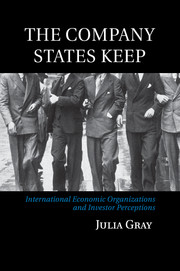Book contents
- Frontmatter
- Contents
- List of Figures
- List of Tables
- Acknowledgments
- 1 Introduction: The Company You Keep
- 2 International Institutions and Sovereign Risk
- 3 The Company You Keep in Comparative Perspective
- 4 The Effects of Good Company
- 5 When Emerging Markets Join Up with Bad Company
- 6 How Risk for Core Members Changes on IO Expansion
- 7 Conclusion
- Bibliography
- Index
3 - The Company You Keep in Comparative Perspective
Published online by Cambridge University Press: 05 October 2013
- Frontmatter
- Contents
- List of Figures
- List of Tables
- Acknowledgments
- 1 Introduction: The Company You Keep
- 2 International Institutions and Sovereign Risk
- 3 The Company You Keep in Comparative Perspective
- 4 The Effects of Good Company
- 5 When Emerging Markets Join Up with Bad Company
- 6 How Risk for Core Members Changes on IO Expansion
- 7 Conclusion
- Bibliography
- Index
Summary
How important is “the company you keep” for emerging markets? This chapter sets out to establish empirically the effect of membership in international organizations on investor risk. The central proposition is that investor perceptions of countries' willingness to repay their debt depends on the quality of other countries with whom they establish ties. When emerging markets align themselves with other countries, in the eyes of investors they absorb those countries' risk levels – associations with good company make a country look less risky, while bad company makes a country look more risky. Specifically, however, the risk that is absorbed comes from investors' perceptions of their partner countries' willingness to repay their debt. The proposed closeness of ties often does not translate into policy reform explicitly, but it serves as a proxy for both the public nature of the commitment and the seriousness of the country's intended allegiances with other countries.
This chapter offers a broad view of the relationship between international economic organization and risk, and shows how that relationship holds up across countries and across time. To test the central hypothesis, I examine the comparable effects of membership in many different types of international organizations, across many regions of the world. I show that the quality of other members in an organization has a distinct relationship with risk perceptions in emerging markets. All else equal, a country that seeks close ties with nations of low political risk will itself look less risky to investors, and the converse is true as well. This chapter shows that even taking into account a country's existing economic and political conditions,markets evaluate what types of international organizations a country joins, and with whom.
- Type
- Chapter
- Information
- The Company States KeepInternational Economic Organizations and Investor Perceptions, pp. 51 - 84Publisher: Cambridge University PressPrint publication year: 2013



